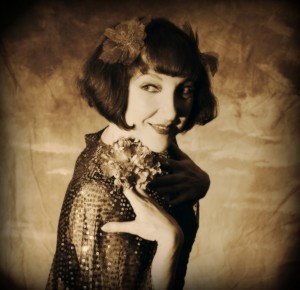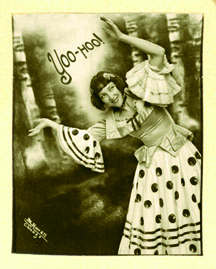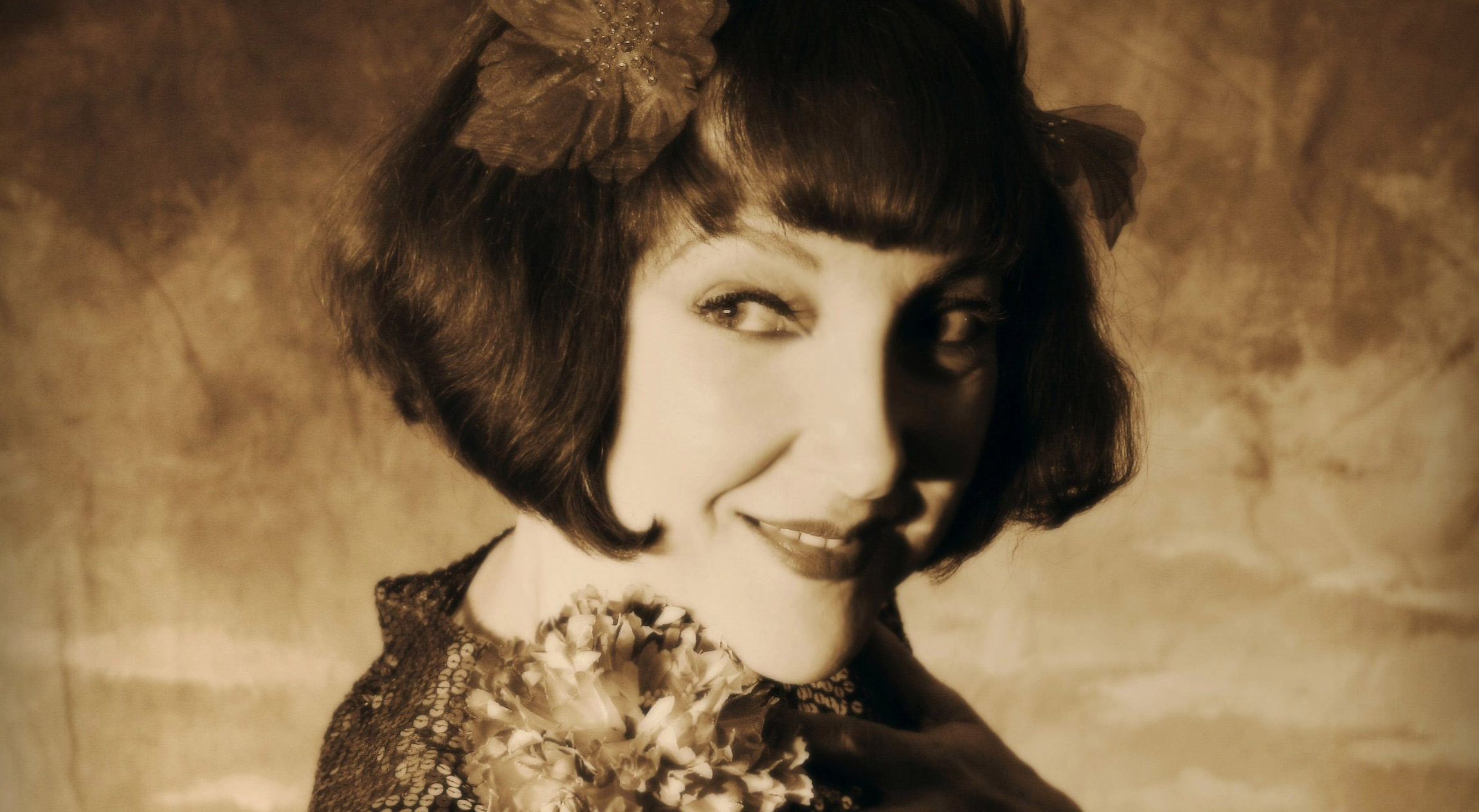INTERVIEW: Janet Klein on her amazing ability to time travel

If you happen to be walking down Hollywood Boulevard in the Los Feliz section of Los Angeles on the first Thursday of the month, there’s a good chance you might unexpectedly fall into a time warp, a refreshingly honest journey to a bygone era of foxtrots, dance halls, banjo plucking and bright red flowers in the hair. The music emanating from the Steve Allen Theater on those fateful Thursday nights are courtesy of Janet Klein and her Parlor Boys, a throwback musical act offering many delightful “songs to cheer in tumultuous times.”
Klein treats the ditties from the early part of the 20th century like a fine aged wine — respecting them, enjoying them and reinventing them. With her backing band and general dedication to transporting the audience to a lost era, the singer takes the stage for some fun-spirited “Whoopee! Hey! Hey!,” as her most recent album is coined. Her voice, captured on seven CDs so far, has a unique simplicity, molding dreamy vocals with clever lyrics — all resulting in an experience somewhat similar to walking into a curio shop where the newest item for sale is 75 years old.
It’s not hard to imagine another Janet Klein living in the 1930s, singing in corner clubs about the “new moon over my shoulder” and the embrace of her “honey’s lovin’ arms.”
Recently, Hollywood Soapbox exchanged e-mails with Klein about her career and aspirations. Here she details her music style, her influences and what audiences can expect when she and the Parlor Boys travel back in time at the Steve Allen Theater.
Going back in time to your first album in 1998 … what first attracted you to this style of music?
My father had a big record collection, mostly classical and early electronic and world music, and so I grew up taking musical listening journeys every night. (In that ceremonial fashion of the past — one side of one LP record at a time.) When I was a student at UCLA, I haunted the music library and found recordings that led me back to what is now my favorite era, stomping ground and treasure trove.
I had always loved black-and-white movies, and the first recordings on LP that caught my eye were of Fred Astaire (singing), Josephine Baker and Kurt Weill and Ira Gershwin singing in the studio, Lotte Lenya … This music was so mysterious to me, most of these first discovery recordings were from film or theatrical presentations, and it all made me want to learn more about the films, the cabaret and theater, the nightclubs of the time.
I had been listening to Big Band era music and this earlier stuff was completely entrancing, not just get-up-and dance music. Musical recordings are like lingering evidence, archeological material that tell you about where it came from, and I think that this music appealed to me because it led me back to New York in the 1930s, which I knew from a certain angle, through my grandparents.
How did you learn to play the ukulele?
I started by plinking around on my own, then started to take my collection of cassette recordings to a couple of people who helped me figure out the chords. The music comes first with me, that interest keeps me going, hungry for more … to make the old songs my own! The technique well … whatever I’ve got is au naturale. I am not a fancy player. All love and enthusiasm.
Is it a tough instrument to master?
The uke is nice in that you can get nearly instant gratification and then from there … “mastery” lays ahead for you, as far as you want to take it. Like any instrument, there are always things to practice, hone, go into deeper and more difficult places .. .or not. Fancy technique isn’t everything, especially when it comes to the ukulele. It’s a small, sincere sound and there is something pure and refreshing about that. I like to say that it’s similar to poetry .. it can be short and sweet or seemingly simple … and mighty!

Who do you count as your inspirations? I imagine there were some singers growing up that hooked you on this career path.
I didn’t discover most of these inspirations growing up — wish I had known sooner! Ruth Etting, Marion Harris, Frances Williams, Blanche Calloway, Lotte Lenya, Adelaide Hall, Annette Hanshaw … lots more.
How have audiences responded to the music over the years? Do you try to transport them back to an earlier era?
Absolutely. For me it’s all about time warp, especially when the setting is right, and if we get it right … that is the BEST!
I think early on, I realized that this music has been so neglected and buried and for me, it was like an antidote for something I felt missing in contemporary culture, and when i started performing it, I felt like I was shocking people.
Of course, these days, “shock” in the sense of being edgy, or grotesque or dark … no, that seems to be everywhere … but shocking people with sweetness. I think people often have stereotyped ideas about what 1920s music is going to be and then they realize that this stuff is smart, infectious, wild in its own way, and lyrically funny and sometimes sublime.
One thing I love is that by sharing my love for the music from the 20s and 30s … once I started to play in front of people, folks have come out of the woodwork to tell me of their relatives and their bands, bringing me old photos, recordings, etc. and record collectors and music and film historians, relatives of composers and lyricists have shared things with me. Pretty wonderful.
Your residency at the Steve Allen Theater is a staple of the Los Angeles music scene. How did that come about?
Well, we are going on our eighth year! We had been playing at the Argyle Hotel, a beautiful Art Deco place, and one night the new artistic director of the brand new Steve Allen Theater came to see us and invited us to play, and well, we’ve been lucky enough to call it our home ever since. It’s great that people know where to find us … first Thursday of every month.
Where do you find some of these songs?
I collect 78 records and sheet music from 1918-1937 and early recordings whereever I can get em. More than collecting 78 records, I really like to collect 78rpm record collectors! I have wonderfully knowledgeable pals. My favorite past-time is vistin’ and listening’.
How did the idea for the miniature books come about?
I have a fine art background and love books and printed matter and collect old illustrated and photographic postcards and things. Along the way, I tripped on something called the “Miniature Book Fair” and got inspired to make some of my own.
By John Soltes / Publisher / John@HollywoodSoapbox.com
-
Click here for more information on Janet Klein and her Parlor Boys. They play at the Steve Allen Theater in Los Angeles the first Thursday of every month at 8 p.m.

